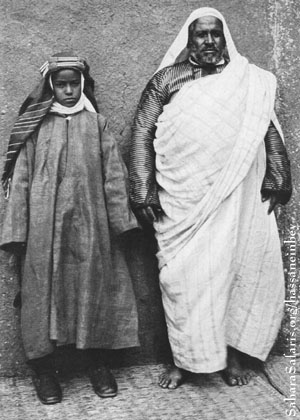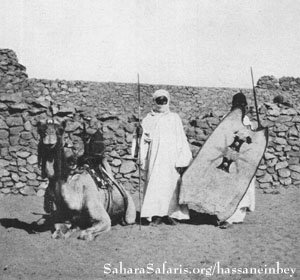
























|
HELPING BIRDS ON THEIR NORTHWARD FLIGHT
It is a trek of nine days from Buttafal well to
Zieghen, across one of the most desolate parts of the world. Birds
migrating northward to Europe, some of them small robins, fly 250 miles
without a drink of water. Sometimes these intrepid travelers, apparently
mistaking us for trees, would alight upon our heads or shoulders (see
illustration, page 254). We would give them a drink, and off they would
fly again. They never made a mistake and started south. As we went along
we saw remnants of wings which told their own story.
During this stage of the journey I used to ask the
guide in the morning to indicate the line of march for the day. He would
trail a line with his stick. I would
(p247)
take bearings on it and check him ten or fifteen times in an hour with
my compass, and he would not waver a yard, walking half a mile ahead of
the caravan. It was extraordinary to watch him, to see that beautiful
straight line.
(p248)

SAYED
MOHAMMED EL ABED'S NEPHEW WITH HIS TUTOR, A SENUSSI "IKHWAN" (LEARNED
MAN)
The ikhwans, in addition to their
responsibilities as teachers, play the role of peacemakers among the
Senussi when a murder is committed. It is they who act as intermediaries
in settling the question of blood money (see text, pages 251 and 252).
[photo page 248]

TUAREGS IN
KUFRA
'The men f this tribe, rather than the
women, conceal their faces, and even when they eat do not remove their
veils. This feat in feeding is accomplished by the use of specially
constructed spoons. For an account of this interesting Saharan
Berber
people, see "Timbuktu, in the Sands of the Sahara," by Captain Cecil D.
Priest, in The Geographic for January, 1924. [photo page 249]
In daylight trekking, the Bedouin uses his shadow
for a compass, and so experienced has he become that his course alters
imperceptibly as his shadow moves in sundial fashion.
About midday he would get in trouble, because
traveling by his shadow, this would then be between his feet!
I caught him at the end of one day in just one
mistake. The stars had not come out, and he was going absolutely due
west when he should have been going south. If I asked him in the
daytime, "Are we going in the right direction?" he would wave his hand
and say, "God knows best!" Of course, "God knows best," said with an air
of assurance, is all right, but if a Bedouin guide tells you "God knows
best" in a hazy way, after you have seen him wobble, it means he has
gone astray.
We lost three camels on this stretch of desert.
Arriving at Zieghen, I was able to correct its
location on the map. Rohlfs, the German explorer, who went before me 45
(p249)
years ago, had located it 62 miles from where it really is. This was not
his fault. He put it down from hearsay, for he had never been there. I
suspected the error when I visited the oasis in 1921, but could not be
sure until I had accurate instruments.
 
|
